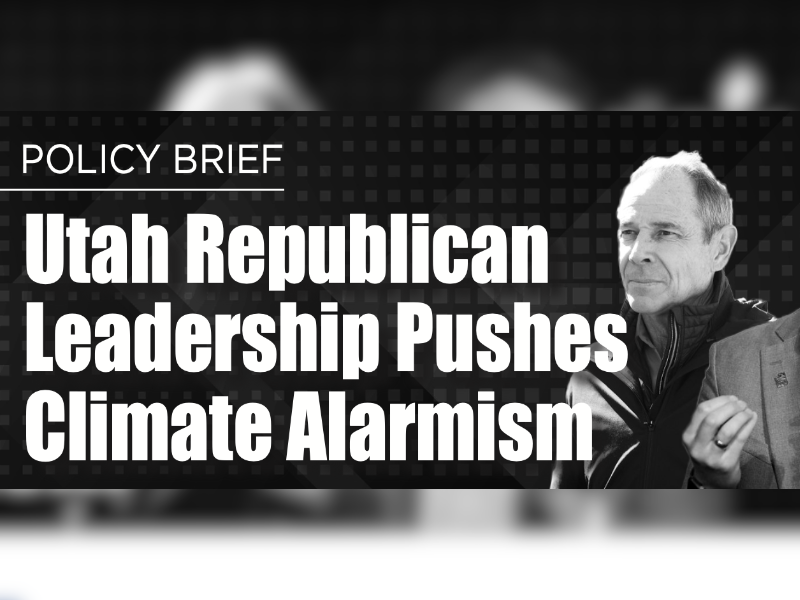In a mid-February hearing before the Subcommittee on Forests and Forest Health of the House Resources Committee, witness after witness testified as to how their local communities have been adversely affected by environmental initiatives funded by big-money foundations headquartered far, far away. The hearing was held to analyze the relationship between large foundations, environmental groups, and the federal government in the development and implementation of environmental policy.
The Pew Charitable Trusts, headquartered in Philadelphia and boasting over $4.9 billion in assets, is reportedly the largest environmental grantmaker, giving over $35 million annually to environmental groups. Pew is the fifth- largest U.S. charitable foundation and third in grantmaking behind the Ford and W.W. Kellogg Foundations. Pew is also a key player in the Environmental Grantmakers Association (EGA), an organization of more than 180 private, corporate, and community foundations. EGA often coordinates foundation grant-making to environmental organizations.
Foundations and “public interest” nonprofits are a large, influential, and expanding industry, according to Ron Arnold, who testified before the subcommittee. During the last 15 years, he said, the number of foundations has nearly doubled from 22,000 to 39,000, while foundation assets now exceed $200 billion. Half of those assets are controlled by fewer than 200 foundations.
Rep. Helen Chenoweth-Hage (R-Idaho), who chairs the subcommittee, charged that the Clinton-Gore administration’s “Roadless Initiative” “appears to have been organized and funded by charitable foundations, primarily the Philadelphia-based Pew Charitable Trusts.” She added, “advocacy for national forest policy initiatives appears to be largely financed by charitable foundations through tax-free grants.”
Arnold, who is vice president of the Center for the Defense of Free Enterprise and author of Undue Influence: Wealthy Foundations, Grant-Driven Environmental Groups, and Zealous Bureaucrats that control your Future, confirmed Chenoweth-Hage’s fears. “There is evidence that the Pew Charitable Trusts planned an end-run around Congress,” said Arnold, “and arranged the Clinton Administration’s new policy to eliminate access to almost 60 million acres of federal land. They did it by an initiative called the ‘Heritage Forests Campaign’.”
According to subcommittee sources, since September 1998, Pew has given the National Audubon Society $3.56 million in tax-free grants to organize the Heritage Forest Campaign. At least a dozen other environmental advocacy groups make up this coalition, including the Natural Resources Defense Council, Earthjustice Legal Defense Fund, Wilderness Society, Oregon Natural Resources Council, American Lands Alliance, U.S. Public Interest Research Group, National Environmental Trust, Alaska Rainforest Campaign, Southwest Forest Alliance, Southern Appalachian Forest Coalition, Sierra Nevada Forest Protection Campaign, and Forest Water Alliance. Pew also made at least $1.5 million in direct grants to finance support for the Roadless Initiative to these other players in the Heritage Forests Campaign.
Subcommittee sources also say some of these coalition participants appear to be little more than fronts for Pew. The National Environmental Trust, for example, is largely funded by Pew, which gave it more than $12.2 million in grants since 1996 for various programs.
Environmental initiatives financed by Pew often receive significant additional tax-free support from other charitable foundations. The Brainer, Bullitt, Nathan Cummings, W. Alton Jones, Weeden, and Turner Foundations, and the Rockefeller Family Fund and Richard and Rhoda Goldman Fund, are known to have made significant grants to Heritage Forests Campaign participants.
Arnold explained that “the environmental movement is a three-cornered structure beginning with tax-exempt foundations which devise multi-million-dollar environmental programs to eliminate resource extraction industries and private property rights. The foundations direct their funds to environmental groups with insider access to the executive branch agencies. This unfairly influences federal policy to devastate local economies and private property.”
Jeff Lyall, a disabled outdoorsman, testified on the difficulty handicapped people have gaining access to national forest lands due to the Forest Service’s anti-roads policy. Said Lyall, “The vast majority of OHV (off-highway vehicle) roads on national forest lands in my area have been closed down. Now I can’t enjoy the outdoors by the only means available to me—and neither can anyone else with a mobility impairment. Since these roads are the only viable access to these public lands by a mobility-challenged person, this is in effect a federal policy of discrimination against the estimated 54 million disabled people in the United States.”
Continued Lyall, “It is large, rich foundations such as the Pew Charitable Trusts that are discriminating against me and the entire disabled community by funding environmental groups to push policies such as ‘Gate and Obliterate.'”
Antonio DeVargas, a minority business owner of a logging company, also testified before the subcommittee. “The Pew Charitable Trusts has funneled money to the New Mexico Audubon Society under the auspices that the money would be used to benefit the villages of northern New Mexico,” he said. “In fact, those monies were used to try to destroy our villages.”
Chenoweth-Hage pointed out that Congress has the sole power to control how federal lands are managed, saying, “Congress possesses the ultimate power over management and use of lands belonging to the United States. If the roadless initiative is universally popular, why can’t the Heritage Forests Campaign get it enacted by Congress through the normal legislative process? Administrative directives , such as the Roadless Initiative, bypass Congress and centralize policy-making authority within the hands of unelected bureaucrats in the executive branch.”



